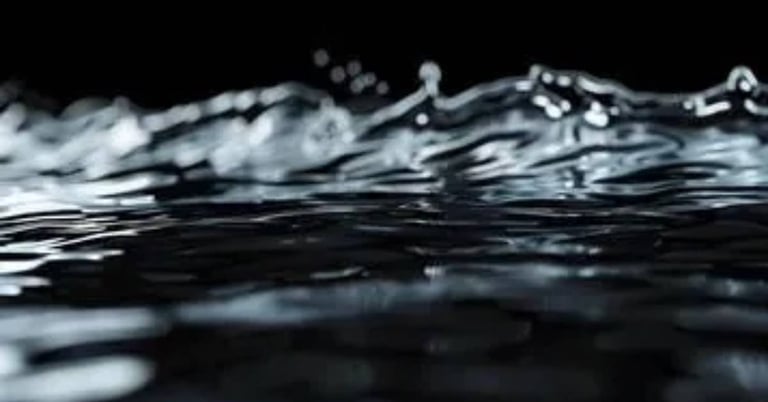11 Facts About Water (H₂O)
Explore 11 unexpected facts about water (H₂O) and look into the science underlying the most important liquid on Earth, from its peculiar behaviour to its strategies for supporting life.
FACTS ABOUT


Water (credit: vecteezy)
We should have understood water by at the moment, would we not? Following the fact that we construct buildings around it, cook using it, drink it, and bathe with it. In reality, though, water is among the strangest and most mysterious elements in the world. It challenges assumptions, violates the laws that other molecules obey, and silently governs the biology, geology, and weather of the universe. I had to go through it repeatedly before I understood that water is densest at 4°C, not at freezing. It was the scientific equivalent of discovering that adding milk makes your coffee hotter. Strange, but accurate. And that is only a small portion of it. These 11 unexpected facts about water demonstrate that it is everything but normal.
Water Can Exist in All Three States Naturally on Earth: Water is not limited to one or two physical states in nature unlike many other substances are. It exists on Earth as gas in the form of water vapour floating above us, liquid in rivers and oceans, and solid ice in the Arctic. It is important for anything from weather systems to agriculture, so it is not simply a fact.
Water Has The Highest Surface Tension of Any Liquid Except Mercury: The only substance with an increased surface tension compared to water is mercury. Water striders and other small insects may practically walk on water because of this fact, which may seem like a science fair truth. In a mechanism called capillary action, it additionally assists plants in "pulling" water up through their roots and stems.
Water is Most Dense at 4°C, Not at Freezing Point: This is the strange part. The majority of compounds grow denser as the temperature drops. Water? At 4°C, it reaches its maximum density. Because of this, lakes do not freeze from the bottom up; instead, the colder water remains on top, forming an ice covering that shields the water underneath. This uniqueness is a huge thank you to life.
Water Expands When it Freezes: Compared to liquid water, frozen water is lightweight due to its approximately 9% expansion. Ice floats for this reason. Whole aquatic ecosystems might come crashing every winter if it failed to do so. If nature had not intervened, you would not have been enjoying iced coffee in the heat.
Water Can Supercool Below 0°C: Water is able to "supercool" and continue to be liquid at -40°C when it is pure or uninterrupted. Though uncommon and brief, it does occur. Pilots are well aware that supercooled water droplets in clouds pose a serious risk of ice buildup on wings.
Water Molecules Constantly Break & Reform Hydrogen Bonds: Water molecules create and dissolve hydrogen bonds billions of times every second. Water's strong cohesiveness (consider droplets) and heat retention (consider of the length of time your tea remains hot) are caused by this constantly changing structure. It resembles an endless molecular dancing.
Water Can Ionize Itself: Not even pure water may be considered "neutral." Hydrogen (H⁺) and hydroxide (OH⁻) ions are produced naturally by a tiny percentage of water molecules. This process, known as auto-ionization, explains the reason why even "distilled" water has some electrical conductivity.
Water Molecules Have a Bent Shape: Polarity is produced by the bent molecule shape of water, namely 104.5°. The hydrogen and oxygen endpoints are somewhat positive and a bit negative, respectively. This explains why water dissolves almost anything, including sugar and salt, and can even gradually dissolve rocks.
Water’s Boiling Point is Anomalously High For Its Molecular Weight: Water is supposed to boil at about -75°C depending upon its molecular weight. In reality, though, it boils at 100°C. Why? Molecules form stronger hydrogen bonds that are extremely difficult to break down. Earth's surface temperatures are steady and habitable due to its exceptionally high boiling point.
Water That is Pure Has a Very Slight Blue Tint: Pure water has a slight blue tint even though it seems "colourless" to the human eye. This is due to red light wavelengths being significantly more absorbed by it than blue ones. To perceive the effect, you require a lot of it, picture the center of the ocean or glacial lakes.
Water Can Dissolve Rocks Over Time: One of the strongest geological factors in the world is water. It may change vast landscapes throughout generations and dissolve minerals in rocks by means of chemical weathering. The Grand Canyon? That is what water does.
Summary: Water (H₂O) Keeps Us Alive
When you consider how many of the ecosystems that sustain life on Earth rely on water's unique features, it is tempting to disregard it or even take it for granted. Water does much more than just satisfy your thirst; it also supports the delicate chemistry that powers our cells and the floating ice that safeguards marine life. You have encountered the unique qualities of water if you have ever stared at dew on a leaf or regretted the ice that broke your water pipe. Nevertheless, existence is attainable by all of these unique features. It is crucial because of the contradictions...a "simple" molecule with complex activity, a liquid that expands when frozen. Consider what is actually in your glass of water the next time you take a sip. Not simply H and O, but a system of strangely twisted physical principles that influenced the formation of a complete planet and all of its inhabitants.
